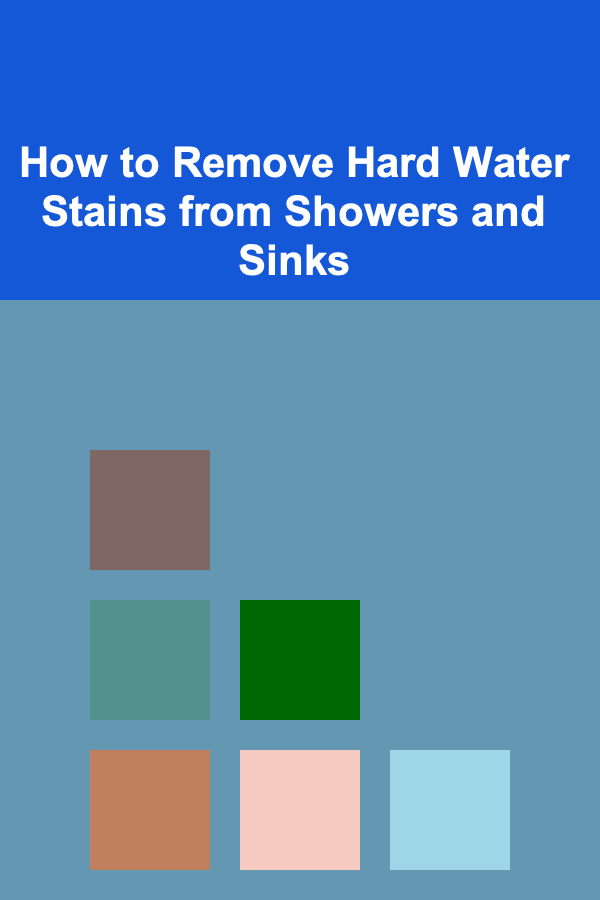
How to Remove Hard Water Stains from Showers and Sinks
ebook include PDF & Audio bundle (Micro Guide)
$12.99$9.99
Limited Time Offer! Order within the next:

Hard water stains are a common and persistent issue in homes, especially in areas with high mineral content in the water supply. These stains, caused by the buildup of minerals like calcium and magnesium, can create unsightly spots on bathroom surfaces, particularly in showers and sinks. Over time, these deposits can harden and become much more difficult to remove, leading to frustrating cleaning challenges. However, with the right techniques and cleaning solutions, you can effectively eliminate hard water stains and restore the shine to your bathroom fixtures.
In this comprehensive guide, we will discuss the causes of hard water stains, how to prevent them, and most importantly, how to remove them from your shower and sink. We'll explore a variety of cleaning methods, from natural remedies to commercial products, and offer tips for maintaining a stain-free bathroom.
Understanding Hard Water Stains
What Are Hard Water Stains?
Hard water stains, also known as mineral deposits or lime scale, are the residue left behind when hard water evaporates on surfaces like glass, porcelain, or metal. Hard water is water that contains a high concentration of dissolved minerals, primarily calcium and magnesium. When hard water is used for activities like showering or washing dishes, these minerals remain behind once the water evaporates, leaving behind stains.
In showers, the combination of hard water and soap scum can create particularly stubborn stains that cling to tiles, glass doors, faucets, and showerheads. In sinks, the minerals can accumulate around the drain and faucet areas, creating rings or cloudy spots.
Why Are Hard Water Stains So Difficult to Remove?
Hard water stains can become challenging to remove because the minerals in the water bond with the surface over time. As these deposits accumulate, they harden and form a layer that is resistant to simple cleaning methods. The longer these stains are left untreated, the harder they become to remove. Soap scum can also contribute to the buildup, making the stains even more tenacious.
In addition, certain types of surfaces, like glass shower doors or natural stone, can be easily scratched or damaged by abrasive cleaners, which makes it essential to choose the right cleaning approach for each surface.
How to Remove Hard Water Stains
1. Natural Cleaning Solutions
For those who prefer to use environmentally friendly or non-toxic cleaning methods, there are several natural solutions that can effectively remove hard water stains. These methods are safe for most bathroom surfaces and often use common household ingredients that are readily available.
Vinegar and Water Solution
White vinegar is a highly effective natural solution for dissolving hard water stains. The acidity of vinegar helps to break down the mineral deposits and restore the surface's appearance. It's also non-toxic and safe to use on a variety of materials, including glass, ceramic, and porcelain.
How to use vinegar:
- Mix equal parts of white vinegar and warm water in a spray bottle.
- Spray the solution generously onto the stained areas of the shower or sink.
- Let the solution sit for at least 10-15 minutes to allow the vinegar to dissolve the mineral buildup.
- Scrub the area with a soft cloth, sponge, or non-abrasive brush to remove the stains.
- Rinse with warm water to remove any remaining vinegar solution.
- Dry the surface with a clean towel to prevent new water spots from forming.
Baking Soda and Vinegar Paste
For more stubborn stains, you can create a paste using baking soda and vinegar. The combination of baking soda's abrasive texture and vinegar's acidity can help to scrub away mineral buildup.
How to use the paste:
- Create a paste by mixing a few tablespoons of baking soda with just enough vinegar to form a thick consistency.
- Apply the paste directly to the stained areas in your shower or sink.
- Let the paste sit for 10-15 minutes to allow it to work.
- Scrub the surface gently with a soft brush or sponge.
- Rinse the area with warm water and dry it with a towel.
Lemon Juice
Lemon juice, like vinegar, is acidic and can help dissolve mineral deposits. It's also a natural deodorizer and leaves a fresh scent behind.
How to use lemon juice:
- Cut a lemon in half and rub it directly onto the hard water stains.
- For larger surfaces, squeeze the juice into a spray bottle and spray it onto the stains.
- Let the lemon juice sit for 10-15 minutes.
- Scrub the area with a soft sponge or brush to remove the stains.
- Rinse thoroughly with warm water.
Borax and Lemon Juice Paste
Borax is a powerful natural cleaner that can help tackle tough stains. When combined with lemon juice, it creates a paste that can effectively break down mineral deposits.
How to use borax and lemon juice:
- Mix 1/4 cup of borax with enough lemon juice to form a thick paste.
- Apply the paste to the affected areas and let it sit for 15-20 minutes.
- Scrub the surface gently with a soft cloth or sponge.
- Rinse with warm water and dry with a towel.
2. Commercial Cleaning Products
While natural remedies can be effective, there are also several commercial cleaning products designed specifically to tackle hard water stains. These products contain stronger acids or chemicals that are formulated to dissolve mineral deposits and remove stains more quickly. However, it's important to use these products with caution, especially on delicate surfaces.
Hard Water Stain Removers
There are many products available on the market that are formulated specifically to target hard water stains. Look for products labeled as "hard water stain removers" or "lime scale removers." These products often contain acids like phosphoric acid or citric acid, which are effective at breaking down mineral deposits.
How to use commercial hard water stain removers:
- Follow the instructions on the product's label.
- Apply the cleaner to the stained areas, using a sponge or cloth.
- Let it sit for the recommended time.
- Scrub gently to remove the stains.
- Rinse thoroughly with water to remove any product residue.
Scrubbing Pads
Some hard water stains may require a little extra scrubbing power. In such cases, you can use specialized scrubbing pads that are designed for tough cleaning jobs. Be sure to choose non-abrasive pads to avoid damaging your bathroom surfaces, especially if they are made of delicate materials like glass or natural stone.
3. Preventing Hard Water Stains
Once you've removed the hard water stains, it's important to take steps to prevent them from returning. Regular cleaning and maintenance can help reduce the buildup of mineral deposits, making it easier to keep your bathroom fixtures looking pristine.
Install a Water Softener
A water softener is a device that removes the minerals responsible for hard water. By installing a water softener in your home, you can reduce the hardness of your water and prevent future mineral buildup on your bathroom surfaces. Softened water is also gentler on your pipes and plumbing, extending their lifespan.
Use a Squeegee After Showering
To minimize water spots and mineral deposits on your shower doors and tiles, make a habit of using a squeegee after each shower. By wiping down the surfaces immediately, you can remove water before it has a chance to evaporate and leave behind minerals.
Regularly Clean Your Shower and Sink
Even if you don't have a water softener, regular cleaning can help prevent the buildup of hard water stains. Make it a habit to clean your shower and sink at least once a week to keep mineral deposits from accumulating. A simple vinegar spray or a quick wipe with a microfiber cloth can go a long way in maintaining a clean and stain-free bathroom.
Dry the Surfaces
After using the sink or shower, use a towel or microfiber cloth to dry the surfaces. This helps remove excess water before it evaporates and leaves behind mineral deposits. Drying the surfaces can be especially helpful in areas with extremely hard water.
Conclusion
Hard water stains may seem like an inevitable problem, but with the right cleaning methods and preventive measures, you can keep your shower and sink looking spotless. Whether you choose natural solutions like vinegar and lemon juice or opt for commercial products, the key is to be proactive in cleaning and maintaining your bathroom fixtures.
By regularly cleaning your shower and sink, using a water softener, and drying surfaces after use, you can minimize the chances of hard water stains returning. With the right tools and techniques, your bathroom can remain free of mineral deposits and maintain its shine and cleanliness for years to come.

From Controller to CFO: Essential Skills and Knowledge for Success
Read More
How to Make Family Time Special with DIY Board Games
Read More
How to Make the Most of Apartment Hunting During Peak Seasons
Read More
How to Safeguard Your Home from Natural Disasters with Security Systems
Read More
Promoting Critical Media Literacy in the Digital Age
Read More
10 Tips for a Morning Routine Checklist That Prioritizes Self-Care
Read MoreOther Products

From Controller to CFO: Essential Skills and Knowledge for Success
Read More
How to Make Family Time Special with DIY Board Games
Read More
How to Make the Most of Apartment Hunting During Peak Seasons
Read More
How to Safeguard Your Home from Natural Disasters with Security Systems
Read More
Promoting Critical Media Literacy in the Digital Age
Read More